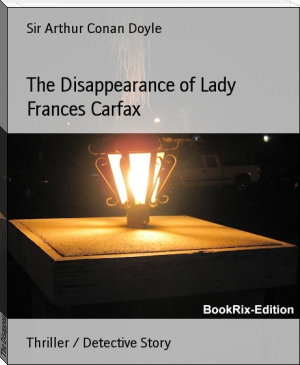His Last Bow - Arthur Conan Doyle (classic books for 12 year olds txt) 📗

- Author: Arthur Conan Doyle
- Performer: -
Book online «His Last Bow - Arthur Conan Doyle (classic books for 12 year olds txt) 📗». Author Arthur Conan Doyle
begin to fall, do they? Yes, I will turn it up, that I may see
you the better.” He crossed the room and the light suddenly
brightened. “Is there any other little service that I can do
you, my friend?”
“A match and a cigarette.”
I nearly called out in my joy and my amazement. He was speaking
in his natural voice—a little weak, perhaps, but the very voice
I knew. There was a long pause, and I felt that Culverton Smith
was standing in silent amazement looking down at his companion.
“What’s the meaning of this?” I heard him say at last in a dry,
rasping tone.
“The best way of successfully acting a part is to be it,” said
Holmes. “I give you my word that for three days I have tasted
neither food nor drink until you were good enough to pour me out
that glass of water. But it is the tobacco which I find most
irksome. Ah, here ARE some cigarettes.” I heard the striking of
a match. “That is very much better. Halloa! halloa! Do I hear
the step of a friend?”
There were footfalls outside, the door opened, and Inspector
Morton appeared.
“All is in order and this is your man,” said Holmes.
The officer gave the usual cautions.
“I arrest you on the charge of the murder of one Victor Savage,”
he concluded.
“And you might add of the attempted murder of one Sherlock
Holmes,” remarked my friend with a chuckle. “To save an invalid
trouble, Inspector, Mr. Culverton Smith was good enough to give
our signal by turning up the gas. By the way, the prisoner has a
small box in the right-hand pocket of his coat which it would be
as well to remove. Thank you. I would handle it gingerly if I
were you. Put it down here. It may play its part in the trial.”
There was a sudden rush and a scuffle, followed by the clash of
iron and a cry of pain.
“You’ll only get yourself hurt,” said the inspector. “Stand
still, will you?” There was the click of the closing handcuffs.
“A nice trap!” cried the high, snarling voice. “It will bring
YOU into the dock, Holmes, not me. He asked me to come here to
cure him. I was sorry for him and I came. Now he will pretend,
no doubt, that I have said anything which he may invent which
will corroborate his insane suspicions. You can lie as you like,
Holmes. My word is always as good as yours.”
“Good heavens!” cried Holmes. “I had totally forgotten him. My
dear Watson, I owe you a thousand apologies. To think that I
should have overlooked you! I need not introduce you to Mr.
Culverton Smith, since I understand that you met somewhat earlier
in the evening. Have you the cab below? I will follow you when I
am dressed, for I may be of some use at the station.
“I never needed it more,” said Holmes as he refreshed himself
with a glass of claret and some biscuits in the intervals of his
toilet. “However, as you know, my habits are irregular, and such
a feat means less to me than to most men. It was very essential
that I should impress Mrs. Hudson with the reality of my
condition, since she was to convey it to you, and you in turn to
him. You won’t be offended, Watson? You will realize that among
your many talents dissimulation finds no place, and that if you
had shared my secret you would never have been able to impress
Smith with the urgent necessity of his presence, which was the
vital point of the whole scheme. Knowing his vindictive nature,
I was perfectly certain that he would come to look upon his
handiwork.”
“But your appearance, Holmes—your ghastly face?”
“Three days of absolute fast does not improve one’s beauty,
Watson. For the rest, there is nothing which a sponge may not
cure. With vaseline upon one’s forehead, belladonna in one’s
eyes, rouge over the cheek-bones, and crusts of beeswax round
one’s lips, a very satisfying effect can be produced.
Malingering is a subject upon which I have sometimes thought of
writing a monograph. A little occasional talk about half-crowns,
oysters, or any other extraneous subject produces a pleasing
effect of delirium.”
“But why would you not let me near you, since there was in truth
no infection?”
“Can you ask, my dear Watson? Do you imagine that I have no
respect for your medical talents? Could I fancy that your astute
judgment would pass a dying man who, however weak, had no rise of
pulse or temperature? At four yards, I could deceive you. If I
failed to do so, who would bring my Smith within my grasp? No,
Watson, I would not touch that box. You can just see if you look
at it sideways where the sharp spring like a viper’s tooth
emerges as you open it. I dare say it was by some such device
that poor Savage, who stood between this monster and a reversion,
was done to death. My correspondence, however, is, as you know,
a varied one, and I am somewhat upon my guard against any
packages which reach me. It was clear to me, however, that by
pretending that he had really succeeded in his design I might
surprise a confession. That pretence I have carried out with the
thoroughness of the true artist. Thank you, Watson, you must
help me on with my coat. When we have finished at the police-station I think that something nutritious at Simpson’s would not
be out of place.”
The Disappearance of Lady Frances Carfax
“But why Turkish?” asked Mr. Sherlock Holmes, gazing fixedly at
my boots. I was reclining in a cane-backed chair at the moment,
and my protruded feet had attracted his ever-active attention.
“English,” I answered in some surprise. “I got them at
Latimer’s, in Oxford Street.”
Holmes smiled with an expression of weary patience.
“The bath!” he said; “the bath! Why the relaxing and expensive
Turkish rather than the invigorating home-made article?”
“Because for the last few days I have been feeling rheumatic and
old. A Turkish bath is what we call an alterative in medicine—a
fresh starting-point, a cleanser of the system.
“By the way, Holmes,” I added, “I have no doubt the connection
between my boots and a Turkish bath is a perfectly self-evident
one to a logical mind, and yet I should be obliged to you if you
would indicate it.”
“The train of reasoning is not very obscure, Watson,” said Holmes
with a mischievous twinkle. “It belongs to the same elementary
class of deduction which I should illustrate if I were to ask you
who shared your cab in your drive this morning.”
“I don’t admit that a fresh illustration is an explanation,” said
I with some asperity.
“Bravo, Watson! A very dignified and logical remonstrance. Let
me see, what were the points? Take the last one first—the cab.
You observe that you have some splashes on the left sleeve and
shoulder of your coat. Had you sat in the centre of a hansom you
would probably have had no splashes, and if you had they would
certainly have been symmetrical. Therefore it is clear that you
sat at the side. Therefore it is equally clear that you had a
companion.”
“That is very evident.”
“Absurdly commonplace, is it not?”
“But the boots and the bath?”
“Equally childish. You are in the habit of doing up your boots
in a certain way. I see them on this occasion fastened with an
elaborate double bow, which is not your usual method of tying
them. You have, therefore, had them off. Who has tied them? A
bootmaker—or the boy at the bath. It is unlikely that it is the
bootmaker, since your boots are nearly new. Well, what remains?
The bath. Absurd, is it not? But, for all that, the Turkish
bath has served a purpose.”
“What is that?”
“You say that you have had it because you need a change. Let me
suggest that you take one. How would Lausanne do, my dear
Watson—first-class tickets and all expenses paid on a princely
scale?”
“Splendid! But why?”
Holmes leaned back in his armchair and took his notebook from his
pocket.
“One of the most dangerous classes in the world,” said he, “is
the drifting and friendless woman. She is the most harmless and
often the most useful of mortals, but she is the inevitable
inciter of crime in others. She is helpless. She is migratory.
She has sufficient means to take her from country to country and
from hotel to hotel. She is lost, as often as not, in a maze of
obscure pensions and boardinghouses. She is a stray chicken in a
world of foxes. When she is gobbled up she is hardly missed. I
much fear that some evil has come to the Lady Frances Carfax.”
I was relieved at this sudden descent from the general to the
particular. Holmes consulted his notes.
“Lady Frances,” he continued, “is the sole survivor of the direct
family of the late Earl of Rufton. The estates went, as you may
remember, in the male line. She was left with limited means, but
with some very remarkable old Spanish jewellery of silver and
curiously cut diamonds to which she was fondly attached—too
attached, for she refused to leave them with her banker and
always carried them about with her. A rather pathetic figure,
the Lady Frances, a beautiful woman, still in fresh middle age,
and yet, by a strange change, the last derelict of what only
twenty years ago was a goodly fleet.”
“What has happened to her, then?”
“Ah, what has happened to the Lady Frances? Is she alive or
dead? There is our problem. She is a lady of precise habits,
and for four years it has been her invariable custom to write
every second week to Miss Dobney, her old governess, who has long
retired and lives in Camberwell. It is this Miss Dobney who has
consulted me. Nearly five weeks have passed without a word. The
last letter was from the Hotel National at Lausanne. Lady Frances
seems to have left there and given no address. The family are
anxious, and as they are exceedingly wealthy no sum will be
spared if we can clear the matter up.”
“Is Miss Dobney the only source of information? Surely she had
other correspondents?”
“There is one correspondent who is a sure draw, Watson. That is
the bank. Single ladies must live, and their passbooks are
compressed diaries. She banks at Silvester’s. I have glanced
over her account. The last check but one paid her bill at
Lausanne, but it was a large one and probably left her with cash
in hand. Only one check has been drawn since.”
“To whom, and where?”
“To Miss Marie Devine. There is nothing to show where the check
was drawn. It was cashed at the Credit Lyonnais at Montpellier
less than three weeks ago. The sum was fifty pounds.”
“And who is Miss Marie Devine?”
“That also I have been able to discover. Miss Marie Devine was
the maid of Lady Frances Carfax. Why she should have paid her
this check we have not yet determined. I have no doubt, however,
that your researches will soon clear the matter up.”
“MY researches!”
“Hence the health-giving expedition to Lausanne. You know that I
cannot possibly leave London while old Abrahams is in such mortal
terror of his life. Besides, on general principles it is best





Comments (0)